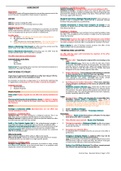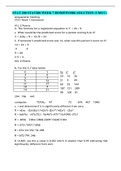AGREEMENT Exception 3 – Invitations to tender:
Spencer v Harding By inviting tenders, you are not making an offer.
Invitation to tender = situations where you need to get some work
Assessment: done and you contact a number of people who may be interested, you
100% of the marks will be given based on one written assessment at the give them the details of what needs to be done. They will then reach
end of the year. Six questions. Must answer 2 questions. out to you again with the price.
OFFER: Blackpool Aero Club v Blackpool Borough Council If the invitation to
tender is also a unilateral offer, there will be a unilateral contract
formed if the prescribed act is performed.
Offeror = person making the offer.
Offeree = person on the receiving end of an offer. Harvella Investments v Royal Trust Company of Canada If the
invitation to tender sets out that they would accept the highest bid,
Definition of an offer: then they must do so.
Treitel “An offer is an expression of willingness to contract on specified
terms made with the intention is to become legally binding as soon as Exception 4 – Auctions:
is as it is accepted by the person to whom it is addressed.” An auctioneer inviting bids is an invitation to treat and the bidders make
the offer. The acceptance at the auction is made once the auctioneer
An offer must: drops the hammer.
1. Be certain – the offeror must know what is being offered.
2. Be addressed to the Offeree Payne v Cave If a person has made an offer that person is also entitled
AND to revoke that offer. But, the offer can only be revoked as long as it has
3. Show intention to create legal relations – this may be implicit or not been accepted. Once the offer is accepted the contract is formed.
explicit. This will be a separate topic later on in the course.
Barry v Davies In case of without reserve auctions the offer of the
Gibson v Manchester City Council An offer must be certain and the highest bidder will be automatically accepted.
word “may” in an offer is not sufficiently certain.
Storer v Manchester City Council Contrasting case. An offer must be TERMINATING AN OFFER:
certain and the word “will” in an offer is certain.
An offer will stay open until terminated by rejection of the offer,
The offer must also be communicated: revocation or lapse.
Communication can be done: Rejection:
- In writing 1. Counter-offer – Rejecting the original offer and making a new
- Orally offer.
- By conduct Hyde v Wrench Facts: There was an offer for the sale of land,
for £1,000. The buyer said that he will pay £995. The seller then
Taylor v Lair The accepting party must also communicate acceptance in sold the land for someone else. When the buyer wanted to
response to the offer by conduct. force the buyer to sell the land to him for £1,000, the court
disagreed as he has already rejected that offer.
INVITATIONS TO TREAT: 2. Battle of the forms – Two companies, both wanting to contract
on their standard terms. None of them ever agreeing.
If you have an expression that might be an offer but it doesn’t fit the Butler Machine Tool v Ex-Cell-O Corp Held: In this case, the last
criteria of an offer, it is an invitation to treat. shot approach will apply. Whoever will finally accept
unequivocally, that will be the agreed final contract.
An invitation to treat has no legal status. It is merely the opening step
in negotiations and because it’s not an offer, it cannot be accepted. 3. BUT! Requests for further information – This is not a rejection,
simply asking for clarification of the terms on which the offer
Invitations to treat: is made.
1. Advertisements Stevenson, Jacques v McLean Facts: There was an offer to sell
2. Displays of goods 3,800 tons of iron. The buyer responded by an enquiry about
the payment. The seller ignored the question and sold the iron
Display of goods: to someone else. The court found that this was not a rejection,
merely a question about the offer.
Fisher v Bell Displays of goods are not offers but merely invitations to
treat. Lapse:
1. Passage of time – Offers only stay open for a reasonable time.
Pharmaceutical Society of Great Britain v Boots In relation to display Ramsgate Victoria Hotel v Montefiore Held: What is
of goods, the offer is made by the buyer when they take the goods to reasonable will depend on the circumstances. – Eg. if someone
the checkout. makes an offer to you to sell a newspaper for 50p this offer is
not going to be open for a whole year. But the offer for a house
Advert: will likely be reasonable to stay open for longer.
Partridge v Crittenden (1968) Advertisements are not offers but 2. Death – Bradbury v Morgan
merely invitations to treat. 3. Non-fulfillment of a condition – Financings v Stimson
Exception 1 – Unilateral offers: Revocation:
Unilateral offer = an offer leading to a unilateral contract. This is an 1. Auctions – Payne v Cave Revocation is effective if it has been
offer that can be accepted by performance of a prescribed act. done before the offer is accepted.
Bilateral contract = typical contract, where one person makes the offer
and other person says that they accept. 2. Only effective once received – Byrne v Van Tienhoven
Carlill v The Carbolic Smoke Ball If the advertisement contains a 3. Third party revocation – Dickinson v Dodds An offer is not open
prescribed act and it is sufficiently clear, it may be a unilateral offer. to someone who has knowledge that the offeror intends to
Lefkowitz v Great Minneapolis Surplus Where an advertisement shows terminate the offer.
intention to create legal relations, it can amount to unilateral offer.
Leonard v Pepsico The advertisement does not amount to a unilateral 4. Revocation of unilateral offers:
offer if it is an obvious joke. A unilateral offer is revoked once the act set out in the offer is
performed.
Offer to the world:
Don’t confuse unilateral offers with an offer to the world. Errington v Errington Woods A unilateral offer may not be
Offer to the world = when you make an offer that anyone can accept. revoked if someone has started performance.
A unilateral offer can be made to a single specific person. Held: Lord Denning: if someone has started performance and it
thus becomes unfair to revoke the offer, the offeror must give
Exception 2 – Limitless supply: a chance to the offeree to finish the performance.
Grainger v Gough (1896) Obiter comments: if an advert is clear, certain
and shows and intention to be bound and there is no problem with Daulia v Four Mill Bank Nominees The offeror cannot prevent
supply the normal rule would not apply. the offeree from performing the prescribed act.
Contract law – Revision Notes | Page 1 of 21
, Shuey v US Offers to the world: for announcing revocation, the Geitreide-Import Gesellschaft If the letter was misaddressed, then not
offeror must use a method similar to how the offer was made. properly posted, unless the reason for the wrong address was the fault
Facts: Difficult to revoke unilateral offers made to the world as of the offeror.
there would be a problem in communicating the revocation. In
this case, revocation will be effective if the offeror uses a Household Fire & Carriage v Grant If the letter was properly posted
method that is “equally notorious” as the method whereby the but lost or destroyed, acceptance is still valid.
offer was made. – Eg. if the offer was made in a newspaper ad,
the revocation should be made the same way to be effective. Henthorn v Fraser If it is not reasonable to use the post in the
circumstances, then the Postal rule will not apply.
These circumstances could be eg. a postal strike so the letter won’t
ACCEPTANCE: arrive.
Objective test: Holwell Securities v Hughes If posting causes a ‘manifest of
inconvenience and abserdity’, the Postal rule will not apply.
Whether a contract has formed, will be decided by an objective test. Eg. if the parties are talking to each other face to face then the
accepting party runs off to write a letter without verbally accepting the
Objective test: whether a reasonable person listening to the offer first.
negotiations between the parties agree that a contract has been made?
Holwell Securities v Hughes If the Postal rule has been ousted, it will
Smith v Hughes If a man conducts himself in a way that any reasonable not apply.
man would believe that he was agreeing to the terms, then he will enter This can be done by the offeror indicates that actual communication is
into the contract, even if his real intentions were not to be bound. required or saying that they want ‘notice of acceptance’, ‘letter to be
Hartog v Colin & Shields But the court will not allow buyers to ‘snatch received’.
a bargain’.
Consequences of the rule:
Requirements: Not beneficial for offerors as there may be people out there who have
already accepted the offer but the offeror would not know until the
Acceptance must be: acceptance is received.
1. A mirror image to the offer – Hyde v Wrench
2. Made by the offeree – Boulton v Jones The post may have been lost or destroyed and the offeror will not know
3. Made in response to an offer – R v Clarke that a contract has already been formed. The position of the offeror is
4. Communicated – Felthouse v Bindley therefore very uncertain.
Byrne v Van Tienhoven Revocation of offer is invalid after acceptance.
Hyde v Wrench The content of what the offeree is going to accept must This is true even if the revocation was sent by a faster method than the
be the mirror image of the content of the offer. acceptance and the offeror did not know that the offer has already been
R v Clarke The offer must be in the mind of the offeree when accepting accepted.
it.
Williams v Cowardine The motive for accepting the offer is irrelevant. Instantaneous communications:
Communicated: Use this rule only where acceptance has been sent by email/telex.
Felthouse v Bindley Silence does not constitute acceptance.
Powell v Lee Acceptance could be communicated by an authorised Entores v Miles Far East Corp The receipt rule: acceptance must have
third-party and still be valid. been received.
Taylor v Allen Acceptance could happen by conduct, even though this
did not happen in this case due to no intention to accept. The Brimnes Communication will be deemed received within office
hours.
Intense Investments Acceptance could happen by conduct. Depositing
the loan amount in their bank account constituted acceptance as this Mondial Shipping v Astarte Shipping If the message was sent outside
was the only interpretation of this conduct. of office hours, the message will be deemed received the first thing
when the office opened again on the next working day.
Exception to the rule on communication:
∑ Unilateral offers – Carlill v Carbolic Smoke Ball Brinkibon v Shahag Stahl There is no universal rule on office hours, the
Unilateral offers are accepted by performance. No need court will always look at the circumstances of the case.
to state: ‘I accept the offer.’
Thomas v BPE Solicitors If there is evidence that the office usually
∑ Offeror’s fault – Entores v Miles Far East Corp operates until late into the evening, then the deemed office hours will
The person accepting must ensure that their message include those hours.
goes through. What if the offeree believes that the
message had gone through but in fact it never did? Eg. Prescribed mode:
in the case of emails, if the acceptance was sent in an
email but the offeror inadvertently deletes the email Use this rule only where the offeror has set out a prescribed method of
without reading it. communication for the acceptance. – eg. please accept by letter or
please don’t accept by post.
If it was the offeror’s fault that the message did not go
through, they cannot then rely on the communication Manchester Diocesan v CGI Prescribed mode will only be binding if it
rule saying that acceptance was not communicated, is explicitly mandatory and rules out all other modes.
even if done inadvertently. Held: If the offeror does not rule out any other mode then all he did was
mention what his preference would be as to communication. – Eg.
∑ The Postal Rule – Adams v Lindsell ‘Please contact me by telephone, not by email.’ or ‘Please contact me
If accepting via post, and posting is done properly, then by telephone, and only telephone.’
acceptance happens as soon as you put the letter in the
letter box. The letter need not actually arrive. Tinn v Hoffman If the prescribed mode does not rule out other modes,
then as long as the other mode is as fast as the prescribed mode, it
The postal rule: will be valid. The other method should not disadvantage the offeror. –
eg. if asked to be telephoned, an email may put the offeror at a
Use this rule only where acceptance has been sent by post. disadvantage eg. if the offeror is blind and cannot read the email.
Adams v Lindsell If accepting via post, then acceptance happens as Quenerduaine v Cole If the offer was sent by an instantaneous method,
soon as you put the letter in the letter box. it will be implied that the acceptance must be sent by an equally
instantaneous method.
Re London and Northern Bank ex. P. Jones (1900) Letter must have
been properly posted, otherwise the Postal rule does not apply. Yates building Society v Pullein If the method was prescribed for the
Held: Letter was handed to a postman who was delivering mail. Because convenience or benefit of the sender then the sender can waive the
the postman was delivering mail and not collecting them he was not prescribed method. – eg. if the prescribed method was tracked post,
authorised to collect mail and thus, the letter was not properly posted this is always done for the benefit of the sender so that they have a
in this case. – There still can be a contract in these cases but the receipt and can see once the post has been received. In this case the
commencement of the contract may be delayed or it could be that sender can simply send the post by normal post and this will not
during that time period, someone else has accepted the offer. invalidate the acceptance.
Contract law – Revision Notes | Page 2 of 21
, CONSIDERATION Must be sufficient:
Chappel v Nestle Consideration must be sufficient but need not be
INTRODUCTION: adequate.
Hamer v Sidway Giving up a legal right is sufficient consideration.
Definitions: Drinking, smoking, swearing and playing cards was deemed to be a legal
right.
Currie v Misa Lush J: Consideration = ‘some right, interest, profit or White v Bluett Giving up a legal right is sufficient consideration.
benefit accruing to one party or some forbearance, detriment loss or Complaining about someone else’s will is not a legal right.
responsibility given, suffered or undertaken by the other.’
Dunlop v Selfridge Dunedin LJ: Consideration = ‘an act of forbearance
PRE-EXISTING OBLIGATIONS:
of one party, or the promise thereof, is the price for which the promise
of the other is bought.’ Something that the promisor is already doing. Can this be valid
consideration? If so, in what circumstances?
Consideration = an element of exchange, whereby both parties provide
something of value to the contract. Consideration is what makes Existing public duty:
contracts enforceable.
Police:
Enforceable = something that is recognized by the court. If a contract is Harris v Sheffield United Existing police duty amounts to good
unenforceable, one or more of the parties can decide to walk away from consideration if the police goes over and above their usual duties.
it and the other party will not be able to make a court claim to enforce
the contract terms. Parental:
Ward v Byham Keeping a child happy and giving them the choice who
to live with is going over and above normal parental responsibilities and
GOOD CONSIDERATION: can constitute good consideration.
The rules of good consideration refer to whether consideration will be Legal:
legally valid in the circumstances. This is not a moral judgement on Collins v Godefroy Attending a hearing as a witness is not good
consideration whether or not consideration was proper, acceptable and consideration as it is an existing legal duty.
providing market value. That will be after the parties to decide.
Existing contractual duty:
General rule:
General rule:
Consideration must: Stilk v Myrick (1809) Performing existing contractual duties will not
1. Not be past count as good consideration.
2. Move from the promisee
AND Exceptions:
3. Be sufficient but need not be adequate Hartley v Ponsonby If the promise can show that they have gone over
and above their existing obligations, that will count as good
Promised to carry out existing obligations is not usually seen as good consideration.
consideration. Williams v Roffey Bros The court developed a 5-stage test to see if
Part-payment of a debt will not constitute good consideration. there is good consideration in any given case.
Must not be past: 5-stage Test:
1. There has to be a contract to supply goods/services between
Past consideration = Where one party has already provided a benefit, A and B
and that party is now asking for a promise in return for that benefit. 2. B has to have a reason to doubt that A will complete his
Eg. An aunt provided childcare for her niece in the past is now asking obligations (on time/at all)
for payment in return for the work she has carried out. At the time 3. B makes a promise to pay A extra in order to complete on time
when she agreed to care for her niece, she agreed to care for her for 4. B obtains a practical benefit/avoids a disbenefit – eg. because
free. She can’t then turn around and change her mind saying that she of this payment, the builders avoided the payment of late fees.
now wants payment for that past work. AND
5. There is no evidence of fraud or duress
Eastwood v Kenyon Past consideration is not enforceable.
Obligations owed to a third party:
Roscorla v Thomas A promise made after the agreement has formed
is not a binding promise. Scotson v Pegg Performing existing obligations owed to a third party
could be good consideration.
Exceptions:
Facts: There was a contract to perform an obligation and Pegg also
Contract made by deed: promised to perform the same thing to a third party.
If a contract is made by deed, then the rules of good consideration will
not apply. Any consideration will be accepted and deemed valid by the Held: This could be good consideration and the consideration here
court. would be allowing the third party the right to sue when things go wrong
or if the performance is not completed.
Deed = a document set out in a prescribed form.
New Zealand Shipping (The Eurymedon) Confirmed what was said in
Pao On test: Scotson v Pegg.
Pao On v Lau Yiu Long Lord Scarman: three-stage test to see if past
consideration could be valid:
1. Consideration must be at the request of the promisor
2. It must have been understood that payment would be due
AND
3. Apart from this issue, contract must be enforceable – eg.
nothing done that is illegal will count as good consideration. All
the usual elements of a contract must also be satisfied.
Re Casey’s Patents In commercial situations, it will be understood that
payment would be due.
Re McArdle This is unlikely to be the case in domestic situations.
Must move from the promisee:
Tweddle v Atkinson A claimant can only make a claim in relation to a
contract if he is the one who has given the consideration.
Dunlop v Selfridge Anyone who has privity can enforce a contract.
s.1 Contracts (Rights of Third parties) Act 1999 Despite this, any person
may enforce a contract if the contract expressly sets out that he may
enforce it or any of the terms confers a benefit to him.
Contract law – Revision Notes | Page 3 of 21













